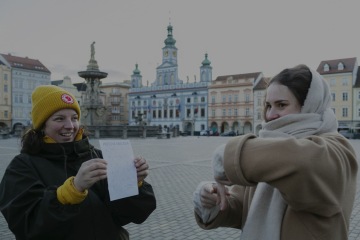Open Season: On Accessibility in Culture
16. September 2024

In its winning application, České Budějovice – European Capital of Culture 2028 committed to making culture more accessible for everyone by 2028.
Therefore, in September, we are organizing the first edition of the Open Season project, which focuses on accessibility in culture. We will address the barriers faced by people with disabilities—whether in cultural buildings, outdoor venues where cultural events occur, during cultural programs, or in the communication of our organizations.
We will present plans to enhance cultural accessibility and take the initial steps towards achieving this goal. We will consult these measures with people with disabilities and involve them in the entire process from the beginning.
We invite you to join us for a week of meetings, discussions, mapping, practical demonstrations, and collaborative creation.
Program details are below.
For any questions, please contact Lucie Bílkova at: lucie.bilkova@budejovice2028.cz.
Program of Open season
MONDAY, SEPTEMBER 16 👉🏽 ACCESSIBILITY PLAN MEETING FOR ČESKÉ BUDĚJOVICE – EUROPEAN CAPITAL OF CULTURE 2028
LOCATION: Riegrova 51, Gallery Hall
TIME: 4 PM - 7 PM
Presentation of approaches and plans for making culture accessible by 2028.
Discussion on how individuals can and want to get involved in planned accessibility activities, informal networking.
In addition to presenting the EHMK plans, we aim to connect and hear voices from people with disabilities, cultural organizations, local government representatives, and non-profit and social organizations engaged in this topic.
for the professional community from České Budějovice
Interpreting will be provided in/from Czech and English, and Czech Sign Language
The venue is accessible via a ramp
Childcare will be provided on-site
TUESDAY, SEPTEMBER 17 👉🏽 PRESENTATION ON DEAF CULTURE
LOCATION: Café Horká vana
TIME: 5:00 PM - 8:00 PM
Film Screening
Discussion with Deaf Individuals – We will discuss the themes from the film and explore what life is like for people with hearing impairments in České Budějovice. What challenges do they face, what solutions help them, and what can we all do to improve inclusion?
Guests: Jan Borovanský from Budějovický spolek neslyšících and Evoluce, Lucie Novotná from Tichý svět
for the public
Venue is accessible
Interpreting available in Czech and English, as well as Czech Sign Language
WEDNESDAY, 18TH SEPTEMBER 👉🏽 Mapping Accessibility of Cultural Buildings (Closed event for participants of the Audience Empowerment program)
THURSDAY, 19TH SEPTEMBER 👉🏽 ACCESSIBLE ARICHITECTURE AND PUBLIC SPACE - INTERACTIVE WALK THROUGH THE CULTURAL ISLAND
LOCATION: Starting at the Biograf Kotva café
TIME: 10 AM - 1 PM
We will map out a route through the city center visiting cultural organizations. On-site, we will identify barriers along the way and discuss potential solutions.
We will also discuss how to plan renovations and new constructions with accessibility in mind and what immediate actions we can take to improve it.
For professionals from České Budějovice
Translation available between Czech and English
The venue is accessible by ramp
THURSDAY, 19TH SEPTEMBER 👉🏽 AUDIO DESCRIPTION WORKSHOP OF THE CITY CENTER AND LANDMARKS
LOCATION: Starting and ending at the Horká Vana café
TIME: 5 PM - 8:30 PM
Try your hand at describing the landmarks and city center of České Budějovice and experience them from a new perspective. In collaboration with the organization Spolu s vámi, we are creating a database of (audio) descriptions so that the beauty of our city can be enjoyed by blind and visually impaired individuals. Be a part of it and contribute your first content!
For the public
Translation available between Czech and English
The venue is accessible
The Open Season Week is organized by České Budějovice – European Capital of Culture 2028 under the patronage of the city mayor, Dagmar Škodová Parmová.
The program is being prepared in collaboration with our colleagues from the Impact Foundation. Throughout the week, we invite additional experts to share their experiences—ranging from working with cultural organizations and other European Capitals of Culture to developing Accessibility Standards for cities like Warsaw and Wrocław.

